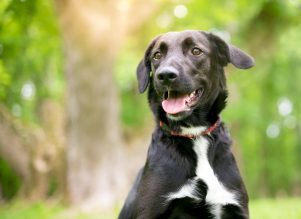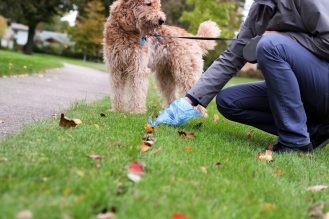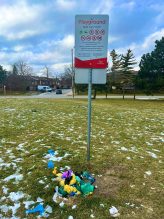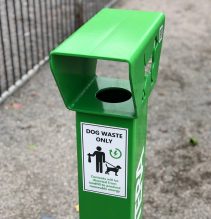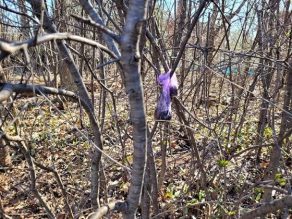No to Poo-llution: Scoop that Dog Poop
Environment | September 28, 2022
Many of us are dog owners and love our furry friends. In fact, more than 60,000 domesticated dogs call Mississauga home. Having a dog can have many pawsitive benefits like getting us outside to exercise, improving our mental and physical health, strengthening our immune system and being a lovable companion. However, owning a dog also comes with many responsibilities including picking up after them.
Pick it up!
It’s completely natural for your dog to use the outdoors as their washroom, but when they do a doo-doo, it’s really important for dog owners to pick up after their pooches and properly dispose of the waste and the bags used to collect it. Doing so keeps recreational, public areas and green spaces clean. It also reduces the risk of spreading disease to people or other animals.
Since January 2021, the City has received 1,188 waste-related complaints through 311.
Health Considerations
Dog waste continues to be an ongoing concern in Mississauga. Dog waste has created a few problems, including contaminating soil and recycling bins and causing increased cleanup costs in parks, trails, sport fields, forests, woodland and sidewalks. Complaints continuously come through 311 about people not picking up after their dogs. While it might not seem like a big deal, the problem adds up quickly.
Many people think dog waste is safe, natural and compostable, but it’s not. In fact, dog waste can pose serious health risks to humans – it can and does, impact local ecosystems. Dog feces can also attract coyotes and rodents like rats. Rodents tend to eat the undigested nutrients in the feces while coyotes are attracted to both.
Dog waste takes months to break down and when left on the ground, it cannot be used as a fertilizer. When it rains, dog waste soaks into groundwater or flows with rain and meltwater into the City’s stormwater system, which flows to nearby streams, creeks, rivers and ultimately Lake Ontario, potentially polluting our drinking water. Polluted water sources require more expensive water treatment before they can be used for drinking water. Contaminated water also affects aquatic wildlife and plants and makes swimming areas unsafe.
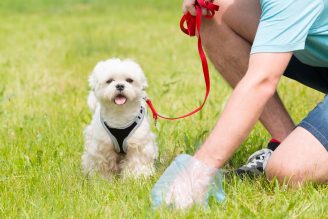
Pet waste is a major source of water pollution in North America. Most commercial pet food contains higher levels of nitrogen and phosphorous. These chemicals have a negative impact on aquatic ecosystems and contribute to lower oxygen levels in water. High levels of nutrients in stormwater runoff contribute to the overgrowth of algae and cyanobacteria in creeks and in Lake Ontario.
According to the Canadian Animal Health Institute, the average dog can produce almost 2.5 kilograms (5 pounds) of waste weekly. Most dogs are on highly processed diets which results in excess nutrients being discarded. Dog waste can contain harmful bacteria (e.g. Campylobacter, E.coli), parasites (e.g. Giardia, Roundworm), diseases, viruses and infections (e.g. Salmonella) and a host of others, which can penetrate soil – making people or other wildlife very sick if exposed to it. It also has a damaging affect on the environment, as it is highly acidic and can harm soil, grass and plants.
Dog Waste and Climate Change (the big picture)
City staff empty about 1,900 waste containers from parks and trails weekly, which also contain dog waste. When the waste is sent to landfill, dog waste decomposes and contributes to methane gas produced within the landfill. Methane gas is a powerful greenhouse gas (21 times more powerful than CO2). It lasts in the atmosphere for more than 10 years and is a primary contributor to ground level ozone that affects our health (UNEP 2021).
Fortunately, methane gas, produced through the decomposition of landfill waste, is captured at landfill sites and either burned or “flared” onsite or used for energy generation. Burning of methane gas removes 95 per cent of the gas available to contribute to greenhouse gas emissions. Unfortunately, methane produced by pet wastes left on the ground to decompose, directly impacts local air quality (generation of ground-level ozone) and contributes to greenhouse gas methane emissions.
As more and more Mississauga residents become dog owners, having the proper infrastructure in place to divert dog waste from landfills is important. Landfill capacity is finite. Waste diversion is essential.
The City’s Dog waste program has been successful in improving waste diversion, seeing a significant decrease in contaminated recycling, from 81.2 per cent in 2017 to 53 per cent in 2020. Thousands of kilograms of dog waste has been diverted from regional landfills and converted into energy (methane capture). This supports Peel’s waste reduction targets and helps to reduce methane emissions
The City has installed several dog waste stations designed to divert dog waste from landfill. Dog waste is stored in below ground containers where it’s cooler and out of direct sunlight and is collected separately and goes to a waste to energy facility. This helps reduce odour and is safer for City staff.
Annually the City spends roughly $42,000 on servicing dog waste stations.
You can find dog waste stations at:
Churchill Meadows Community Common
Community Common Park
Jack Darling Memorial Park
Lake Aquitaine Park
Lakeside Park (Leash-Free Zone)
Quenippenon Meadows (Leash-Free Zone)
Totoredaca Park (Leash-Free Zone)
But despite installing dog waste containers and regular waste containers throughout the city, plastic bags filled with dog waste continue to find their way in all kinds of places like recycling containers, on the ground on trails, in forests and on bushes.
Stop the Problem
The solution is very simple. Bring dog waste bags with you when walking your dog. Remember to place dog waste in waste containers (garbage bins) or a designated dog waste container or take it home and throw it out with your garbage.
Residents are reminded not to leave dog feces or put dog waste bags on the ground or in recycling containers. Recycling contaminated with dog waste and bags is sent to the landfill for disposal, which means valuable recyclable materials are also sent to the landfill. If you see a full dog waste container, garbage bin or recycling container, please call 311 to report it.
Throw dog waste along with the plastic bag in the garbage and remember to wash your hands thoroughly after handling dog waste.
Report Dog Waste Incidents
While the City doesn’t patrol for dog waste issues, it is taking a community-based approach to address concerns.
You can be fined for not picking up after your dog. If caught, the fine is $115. Please continue to report issues. If you’d like to request enforcement or clean-up in a specific area, please call 311.
Tags
Media contact
City of Mississauga Media Relations
media@mississauga.ca
905-615-3200, ext. 5232
TTY: 905-896-5151
